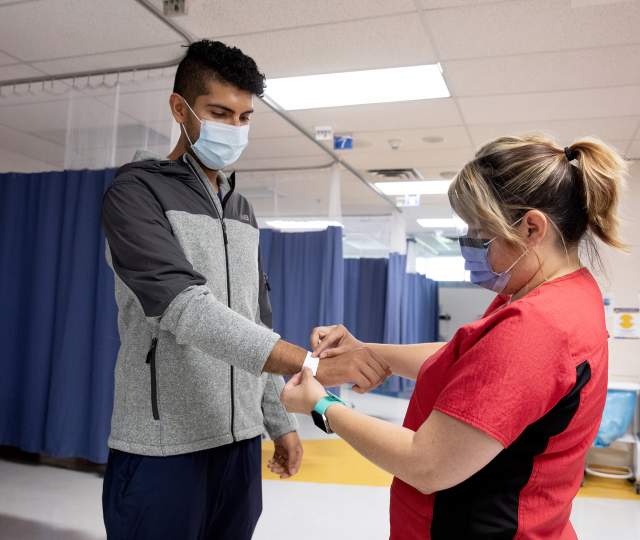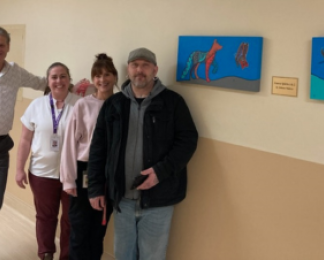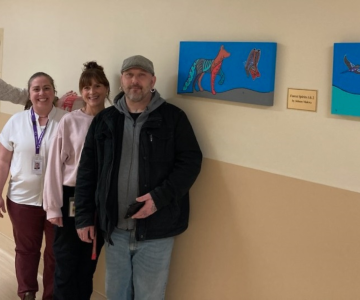Ambulatory care
Our ambulatory care clinics provide medical services and day procedures that do not require an overnight stay, including specialist consultation, observation, diagnosis, intervention and/or treatment.
Learn about the medical services and day procedures we provide that don’t require an overnight hospital stay.

Our ambulatory care clinics provide medical services and day procedures that do not require an overnight stay, including specialist consultation, observation, diagnosis, intervention and/or treatment.
Intravenous (IV) therapy is the delivery of fluids, medications or blood products into a person’s bloodstream. Depending on the treatment ordered by a doctor, a patient may need to visit more than once.
Our cast clinics provide care for people requiring cast application or removal, as well those who need orthopaedic post-trauma or post-operative follow-up by an orthopaedic surgeon.
We conduct urodynamic testing to investigate how well your bladder and urethra are working. Most urodynamic tests focus on the bladder’s ability to hold urine and empty completely.
View urodynamic assessment information from HealthLinkBC and the Canadian Urological Association.
Endoscopy is a procedure that allows a doctor to view the inside of a person's body. Endoscopic procedures include:
See below for more information about your type of endoscopy procedure.
A small flexible tube with a camera (colonoscope) is passed through the rectum and moved through the large bowel to the point when the small and large bowel meets (cecum). View the following documents for more information:
A small, short flexible tube with a camera (sigmoidoscope) is passed through the rectum to examine the lower end of the large bowel (sigmoid colon). View the colonoscopy patient information document for more information.
A small flexible tube with a camera (gastroscope) is passed through the mouth, down the esophagus (swallowing tube), and into the stomach and first part of the small bowel (duodenum).
View the following documents for more information:
A small flexible tube with a camera (duodenoscope) is passed through the mouth and stomach to examine the ducts (tubes) that drain into the small intestine from the gallbladder, liver or pancreas. View the following documents for more information:
A small, short tube with a magnifying instrument (colposcope) is passed through the vagina to examine the cervix. View the colonoscopy patient information document and visit BC Cancer’s Colposcopy web page for more information.
A thin flexible tube with a camera (cystoscope) is passed through your urethra (urinary tract) and into the bladder. The cystoscopy clinic is an outpatient urology clinic that examines, diagnoses, and sometimes treats urinary tract and bladder problems.
View cystoscopy information from HealthLinkBC and the Canadian Urological Association.
A small flexible tube with a camera (bronchoscope) is passed through your mouth and into the lungs. This allows for examination of your throat, larynx trachea and lungs. View the bronchoscopy patient information document for more information.


Jayme helps ensure lived experiences are not just welcomed but embedded across Mental Health and Substance Use services at IH.
/stories/we-are-ih-coordinator-centers-peer-voices-care


As temperatures drop, it’s important to be aware of the health risks of cold. Here's what you can do to ensure you remain safe and healthy.
/stories/how-protect-yourself-and-others-when-temperature-drops


Heart disease is the number one killer of women worldwide and the leading cause of premature death in Canada. One in 3 women will be affected by heart disease.
/stories/how-women-experience-heart-disease-differently-men


Wavemakers is a free, groundbreaking virtual reality career-building program where post-secondary students can build skills and connect with employers like IH.
/stories/ih-helps-students-explore-careers-through-virtual-reality-program


Interior Health (IH) and our community partners offer mental health services for youth and adults. Our services are confidential and safe, and free of judgment
/stories/mental-health-services-youth-and-adults-interior


Renowned Métis artist Johnny Mukwa’s donation of two art pieces to Kootenay Lake Hospital comes from a deeply personal place.
/stories/new-indigenous-artwork-welcome-addition-klhs-oncology-department
Receive news, alerts, public service announcements and articles right to your inbox.
